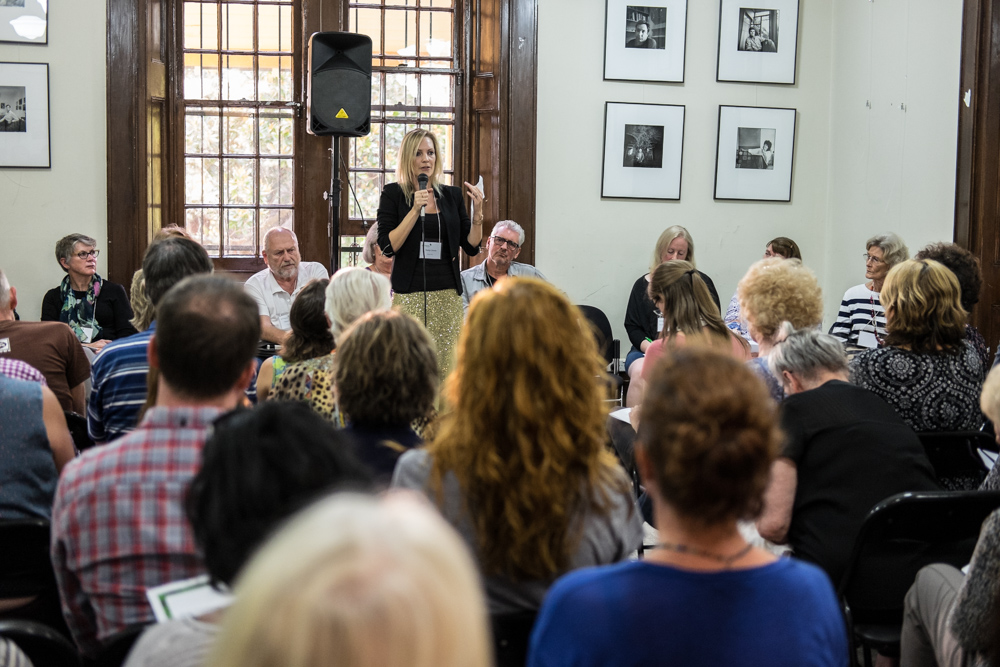
‘If you’ve ever thought about joining a group, stop thinking and do it.’
Such is the resounding mantra from the groups represented at the Centre’s 2017 Writers’ Group Open Night, a lively event that celebrated some of the 30 writers’ groups who meet at the Centre.
The evening showcased thirteen groups of varying sizes that write everything from poetry to picture books. Despite the differences in group size, aim and meeting structure, all representatives agreed on the value of joining a writing group.
‘Friends and family just don’t get it like other writers do,’ says Shelly Unwin, keynote presenter and member of the Picture This writers’ group.
Shelly is making her authorial debut this June with a five-part book series with Allen & Unwin, to be swiftly followed by a nonfiction book in 2018 with Penguin Random House. Like other speakers, she attributes much of her success to the support and guidance of her group.
The speakers were asked to tell us about what works best for their groups and what tips and tricks they have for new groups starting out. Here’s what they had to say.
1) Find likeminded members
Finding members can be tricky enough if you are forming a new writing group, let alone finding likeminded members. However, ‘likeminded’ doesn’t have to mean writers in the same genre – the key is to have shared aims.
Writestuff, a group that practice spontaneous writing during their sessions, has members that write everything from memoir to zombie stories. ‘We’re just writers who play with words,’ says convenor, Judith Daley. ‘We have no clear outcomes other than encouraging each other to write. Anything goes.’
Other groups, such as Monday Night Children’s Writers, all write broadly for children, but to varying ages. These differences can often be complementary, as convenor Marian McGuinness finds that YA writers often have great advice for picture book writers and vice versa.
Interestingly, many of the groups who spoke on the night were founded at the end of a writing course. Already familiarised with each other’s personalities and linked together by a common interest (be it novel writing, world building or creativity), the groups formed organically.
This is particularly the case with long courses, such as Year of the Novel, which produces a new writing group almost every year.
‘At the end of a course, you get to know each others’ writing,’ says Janet Nagly, convenor of Write to the End, whose group formed after a long course as a way to keep momentum.
2) Agree on ground rules

Developing a thick skin takes time, particularly when you are used to receiving glowing feedback from friends and family. Setting up ground rules, including a process for giving and receiving feedback, is an important consideration for every group starting out.
Stuart Campbell, a member of the Write On! group, admits that it can be scary stuff when the group doesn’t like your work. ‘Sometimes you go home with a D-,’ he says, adding that ‘it’s very important for the group to know the boundaries and when to stop’.
This can be as simple as outlining a system for structuring feedback, such as stating what you like about the work before suggesting where it could improve.
For the Youngstreet Poets, whose original members started meeting in 1978, the preferred method is to comment on the craft itself and offer personal responses rather than provide literary critique. A facilitator sometimes intervenes in the discussion to let quieter voices get heard.
3) But remember to do it your way…
In her keynote speech, Shelly Unwin thanked Penny Morrison, founder of Picture This, for inviting industry professionals to speak at their meetings. This would usually involve a publisher or editor who would speak about the industry before providing feedback on the group participants’ manuscripts.
At one such meeting, Shelly was asked to formally submit her manuscript after the session, which directly led to a publishing deal.
Many other representatives at the Open Night shared the ways that their groups do things differently.
Some groups, such as Storyism and Dandelions, take their meetings to the road and attend literary events, book launches and writing retreats together. Others have created an online headquarters to communicate through, such as a website, Google docs or Facebook page.
The speakers demonstrated that there is no ‘one-size-fits-all’ when it comes to running a writing group.
Take it from our experts: however you do it, just make sure you do it.
***
Join or start a writers’ group
If you are looking to join an established group rather than start afresh, then it’s recommend that you test a few out first to see which one is the best fit. Before signing up to a group, ask the convenor if you can attend as a visitor until you find the one that’s right for you.
For a list of existing groups in NSW, click here (groups are divided by genre and region).
Haven’t found your dream group yet? Try starting one. We have developed a handy resource with a list of tips that you can find here.
If you have any questions about our writers’ group program, email info@nswwc.org.au.
